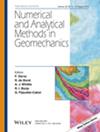Cross‐Scale Simulation Study on the Wetting Mechanical Properties and Deformation Characteristics of Rockfill Materials
IF 3.6
2区 工程技术
Q2 ENGINEERING, GEOLOGICAL
International Journal for Numerical and Analytical Methods in Geomechanics
Pub Date : 2025-09-25
DOI:10.1002/nag.70073
引用次数: 0
Abstract
The cross‐scale approach based on the finite element method (FEM) and discrete element method (DEM) was employed to investigate the effects of different particle shapes and stress conditions on axial deviatoric stress during wetting. A DEM modeling framework was proposed to simulate the wetting tests considering different particle shapes. The Effect of varying particle shapes on the stress‐strain and volumetric strain behavior of rockfill materials during the wetting process was investigated. Moreover, the study analyzed macroscopic characteristics such as axial and volumetric wetting deformation under triaxial test conditions. Furthermore, the mesoscopic mechanisms influencing the wetting behavior of rockfill materials were investigated using internal sample features such as Euler angles, coordination number, and contact fabric distribution. Finally, a wetting constitutive model incorporating particle shape characterization indices was proposed and validated across multiple scales. This study provides a novel approach for the accurate evaluation and safety control of the structural behavior of high rockfill dams.填石材料润湿力学特性及变形特性的跨尺度模拟研究
采用基于有限元法(FEM)和离散元法(DEM)的交叉尺度方法,研究了不同颗粒形状和应力条件对润湿过程中轴向偏应力的影响。提出了考虑不同颗粒形状的湿化试验的DEM建模框架。研究了不同颗粒形状对填石材料润湿过程中应力应变和体积应变行为的影响。此外,研究还分析了三轴试验条件下的轴向和体积润湿变形等宏观特征。此外,利用欧拉角、配位数和接触织物分布等内部试样特征,研究了影响堆石料润湿行为的细观机制。最后,提出了一个包含颗粒形状表征指标的润湿本构模型,并在多尺度上进行了验证。该研究为高堆石坝结构性能的准确评价和安全控制提供了新的途径。
本文章由计算机程序翻译,如有差异,请以英文原文为准。
求助全文
约1分钟内获得全文
求助全文
来源期刊
CiteScore
6.40
自引率
12.50%
发文量
160
审稿时长
9 months
期刊介绍:
The journal welcomes manuscripts that substantially contribute to the understanding of the complex mechanical behaviour of geomaterials (soils, rocks, concrete, ice, snow, and powders), through innovative experimental techniques, and/or through the development of novel numerical or hybrid experimental/numerical modelling concepts in geomechanics. Topics of interest include instabilities and localization, interface and surface phenomena, fracture and failure, multi-physics and other time-dependent phenomena, micromechanics and multi-scale methods, and inverse analysis and stochastic methods. Papers related to energy and environmental issues are particularly welcome. The illustration of the proposed methods and techniques to engineering problems is encouraged. However, manuscripts dealing with applications of existing methods, or proposing incremental improvements to existing methods – in particular marginal extensions of existing analytical solutions or numerical methods – will not be considered for review.

 求助内容:
求助内容: 应助结果提醒方式:
应助结果提醒方式:


